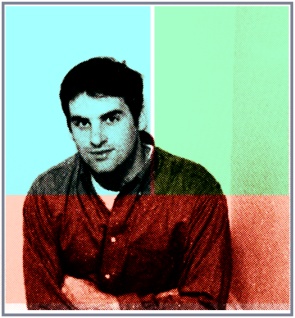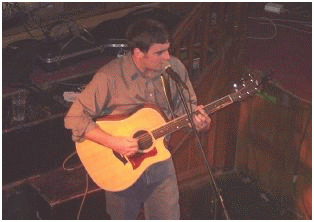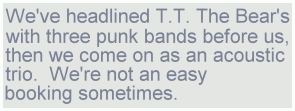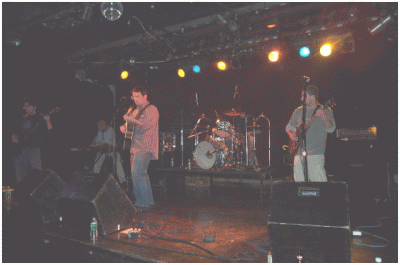|


Boston
Beats: Please state your name, age and occupation for the record please.
Chris Canty: Chris Canty, 31. Singer-songwriter by night, and I have
a day job. I work at Boston College in the Finance Department.
HISTORY
----------
BB:
How did you first get into music?
CC: My oldest sister got me into music. She used to listen to a lot
of good music, and when I was about nine I really started to pick up on
it. She was always playing the Stones, U2, Springsteen. I used
to sneak in to her room when she wasn't around and play them. I was
hooked.
BB:
When did you actually learn how to play?
CC: I bugged my parents for a guitar for about two years. Got my
first one when I was about fourteen. Played it for a good six
months, thought it was too hard, put it down. Picked it up again six
months later and haven't put it down since.
BB: When did you write your
first song?
CC: I started writing when I was about fifteen or sixteen. I had a
small cassette four-track, if I did anything that I felt good about I'd
record it. The tapes are in a big box somewhere now. Some
serious blackmail material there.
BB: When did you first play out?
Were you ever shy about playing on stage?
CC: I didn't really play out until I got into college, and even then it
was mostly open mics up at the Kendal (rest in peace). Yeah, I was
terrified. I shouldn't say "terrified," but definitely "nervous" the
first couple times I played. But you've got to trust in your songs, and
the work you put in. Now I feel like I could go in front of
thousands. I don't see the point in being nervous. You know
the structure, you know what you're gonna sing. It's not like you've
got to hit a 30-foot jump shot with two seconds on the clock. Just
go out and have fun.
BB: When did you get serious
about music?
CC: My senior year I read a book called "All
you need to know About the Music Industry"
by Donald Passman. After reading that I thought I wanted nothing to
do with the music industry. I had always looked at music ideally,
and that was the first time I'd actually seen the business side of it.
It turned me off a bit. But a year after college I decided, alright,
I know what it is and I'm still gonna go for it. Eventually I
recorded an EP called Worthwhile. It was me, Chris Lannon on lead
electric, Scott Bressler on bass, and the only drummer I've ever played
with: Mark DeToma. Mark is really the heart and soul of the band.

BB:
How did your next album come about, No Ordinary Life?
CC: In 2000 I met Liam Bailey, a guitarist from Berkeley. We were
both playing upstairs at the Middle East. A few months later I was
looking to add a lead guitarist to the band. I emailed him, we
talked and he joined the band. He played all the lead parts on No
Ordinary Life. Before we recorded the album, Liam moved down to
Norwalk, CT to work in a studio called
Playroom Studios
with his friend Brian Sargent. Brian co-produced No Ordinary Life
with me, and volunteered to engineer it. He knew all the guitar
parts, and he was willing to travel back up to Boston to play with us, so
Brian Sargent became our lead guitarist. He's such a killer studio
musician that we can get away sometimes without him there for rehearsals.
Mark DeToma still plays drums, but Scott has left the band. Right
now we have Mike Fitzmaurice on bass, and if it's a bigger venue we'll
also have keyboards. Chad Kelly is our keyboardist. And he's
also the third in the trio that is Playroom Studios. It's Chad,
Liam, and Brian. They're all Berkeley guys.
BB:
So Brian, Mark, Mike, Chad and yourself make up the "Chris Canty Band." You
guys are working on a new project. Tell me about that.
CC: It's gonna be a little different, a little more pop. I think
we're gonna rock out a little more on this next one. There's also
gonna be a lot more space on this album, texturally. It's gonna
breath a little more. These songs call for it. It'll be a
roots-rocker, though. We can't shy away from what we are. We
are a roots-rock, singer-songwriter band.
WRITING AND RECORDING
-----
BB: What are your musical
influences?
CC: I've always been drawn to the singer-songwriters.
Dylan.
Springsteen.
Bono. I
listen to the
Chieftains, some
Celtic stuff. And I listen to a lot of radio.
WBRS. Everything
Daniel Lanois has
ever done, and the stuff he's done with Bob Dylan, Time Out Of Mind, that
textured guitar sound.
BB:
How would you describe your own style?
CC: I think it would probably be textbook singer-songwriter stuff.
We're not breaking any new ground with this. We're never going to be
"popular" or "trendy." We're not going to cuff our pants a certain
way or wear fancy glasses or sport coats. We're just average guys
who love music.
 BB: What's your process for
writing lyrics? BB: What's your process for
writing lyrics?
CC: I take a lot of time writing lyrics. Obviously you have to have
a melody, you have to have a hook. But if the lyrics are crap, to me
the whole thing is you're crap. And for me lyrics are always last.
I know some people can write lyrics and then write a melody, but it never
happens that way for me.
BB: So how does a new song
usually come about? What's the process?
CC: Everything that I write is on acoustic guitar. I come up with a
melody, something I can sing over. I'll play it before I go to bed,
or when I get up. For the most part I'll have the vocal melody in my
head when I'm writing the guitar, but I might just mumble until I have
actual lyrics. If I hear something that I want to catch then I'll
put it on tape. Often when you're playing a song you don't get a
feel for it, but if you listen back to it you can feel it. And
sometimes I'll just run the tape, with no song in mind. I'll play for 45
minutes, come up with different structures, different melodies. Then
I'll listen to the tape, mostly while I'm driving, and sing with it for a
while. If it catches me acoustic (if something sticks), I'll say
okay, next rehearsal I'm gonna show it to the band. Then it depends
on how it hits them. They might be really into a song that I'm still
wavering on. They might say "play that one again, there's something
about that that's really hitting me," and we'll work on that. Maybe
it's too long and we'll change the structure. We'll tighten it up a
little bit, flesh out what works and what doesn't.
BB: Do you prefer the studio or
playing out?
CC: Usually playing out. The studio is excruciating.
PLAYING OUT
 ----- -----
BB: What makes a good show?
CC: That's a tough question. We've had nights playing for four
people that were incredible and nights in front of 300 people that were
not. It depends on how the band is communicating on stage and how we're
clicking. And how much each of us has had to drink before we go on.
(Just kidding.) I'd like to say that all our shows have been
incredible rock shows, but we definitely have our favorites.
BB: What was one of your
favorite shows?
CC: We played the Paradise last February. We opened for Machinery
Hall. That would have to be the show.
BB: What kind of equipment do
you use?
CC: Right now I play exclusively acoustic. I play a Taylor 414C.
It's a great sounding guitar whether it's run direct or it's mic'ed up.
It's a great studio guitar, it's just an all around workhorse. And
beautiful tone to it. And then I go through a Line Six delay pedal, which
gives me that ambience and texture. Brian plays a hollow-bodied
Guild, and he plays Strat and Telecaster. He also goes through the
Line Six delay, which gives you that "huge" sound. Mark plays a
vintage Gretsch kit, which we've traced to sometime in the sixties.
It's just a great vintage booming kit. Fitzy plays an Ibenez bass
through a Galien Kruger amp, which the band just bought. It's a
powerful amp, compact and easy to travel with. There are some nights
when we have to plug into a big system, but there are some nights when
we're playing pubs or bars, and the amps have to carry the room. I
think we set up well in any venue.
BB: Any pre or post show
rituals?
CC: The one ritual we have is that I never drive before a show. It's
kind of a pain in the ass for the rest of the band sometimes. But
they're excited that they can drink after, and I'll drive home. We
just went to NY and Mark was caught stuck with Manhattan traffic at rush
hour on a Friday night, while I'm just sitting in the back of the van.
At 2 am it's not as bad.
BB: Do you guys do any
interesting covers?
CC: I'd probably consider us one of the worst cover bands ever.
We've done a song called "Hallelujah Jordan" by Hothouse Flowers, an Irish
band. And I've done a Tom Petty song. I think I've played "(What's
So Funny 'Bout) Peace Love and Understanding." But that's it though.
We're all original.
 BB: What are your fans like? Any
crazy stories? BB: What are your fans like? Any
crazy stories?
CC: We were playing a place a couple years ago up in Newburyport, MA.
It was called the State Street Grill. It had a crazy glass stage
with three levels to it. The band would actually play between
floors. If you stood on the third level you could look straight down
into the bottom of it. So we literally had people below us as we
were playing, drinking beer and hanging out right below our feet. We
were playing, and with two songs to go I looked down, and these two girls
were directly below my feet. They pulled back their shirts, and
proceeded to flash the band. It was funny because two of my sisters
were there at the show, sometimes they'll come out if it's close enough.
After the show those girls came up and they asked me to sign their chests.
I had to sign a CD instead because I was getting a dirty look from one of
my sisters.
BB: Tell me about your audience.
What kind of people tend to get into your music?
CC: We're not very trendy, we don't appeal to too many eighteen year olds.
I think our audience tends to be graduate school or college, people who
are drawn to serious singer-songwriters. People who look for a
little more lyrically. We do have that
"get-everybody-to-shake-their-ass-and-get-up" kind of aspect to it, but
hopefully we challenge people too, to try to figure out what a song is
about, and what a particular line means. It goes back to the people
that I've always listened too.
BB: What are your favorite
places to play?
CC: I like the Middle East downstairs a lot. We love The Paradise.
The only problem with places like that is that quite often your set is 45
minutes, but to me, the band is only warming up at 45 minutes. My
ideal set is two to two and a half hours. It gives you some room to
breathe in the middle, to slow things down for a couple of tunes and then
build up for a big ending. With a short set you feel like you have
to throw your best at people. Some of the best performances we've
done are songs that we typically wouldn't play in a 45-minute set. You
can't really do that in a 45-minute set.
THE BOSTON MUSIC SCENE
-----
BB: What are your favorite local
bands?
CC: I'm a big fan of
Machinery Hall, a great local band out of Salem, MA.
And a band called
Sand Machine. There's a cool band up in the NH
area called
Pondering Judd. We've played a lot with Search Engine,
also from Salem. We're a tough fit sometimes, though. We're
not quite alternative rock, and we don't fit in with your typical folk
artist, because we're edgier than they are. We've headlined T.T. The
Bear's with three punk bands before us, then we come on as an acoustic
trio. We're not an easy booking sometimes. But I like that
aspect of us.
BB: How does the audience react
in those cases?
CC: Good. We'd like to think we can do something that everybody in
the club can appreciate. They might not necessarily love it, but
you'd like to think that as a musician the people in front of you can
appreciate something you've done.
BB: How would you compare the
scene in Boston to the other cities you've played in?
CC: We've played New York. New York's kind of tough. A good
draw in New York in the places we play would be 25-30 people. We're
making some headway into Portsmouth NH, and Portland. But we try to
stay in the region. And we played Dublin.
BB: How was playing in Dublin?
CC: We had the whole American thing going for us, so the reaction was a
little heightened, I think . We'd arrive at a place and there'd be a
big banner out front saying "Chris Canty Band from Boston, First Time
Appearing in Ireland." Here they'd be like "Quick, do your set and
get off." So that was unique. The Irish tend to be very much
into music and writing, and the arts in general. I think they
appreciated what we did. Boston can be a much tougher scene, there's
no doubt about it.
BB: Why is that, do you think?
CC: It's almost as though there's so much music here, that it's hard to
differentiate yourself sometimes. Someone once told me there might
be 3000 bands in Boston. When you go out into rural Pennsylvania or
Connecticut or western Mass they don't have a quarter of that. They
appreciate that they're seeing good live music. In Boston there's so
much good live music that fans here can be spoiled by it. But we've
done well here.
IN CLOSING
-----
BB: If you could play on stage
with anyone alive who would it be?
CC: That's tough. I think it would have to be either U2 or Bruce
Springsteen. They're ultimate performers. That's how they built
their fan base.
BB: If you had to do something
besides music what would it be?
CC: First thing, if I wasn't a musician I wouldn't want anything to do
with the music industry. I wouldn't want to be a manager or
something like that. But if I could do anything else? I don't
know, I'd probably love to run a bar or coffee shop up in Portsmouth.
BB: What do you hope to be doing
in music in a few years?
CC: We're still doing a lot with this current album, No Ordinary Life, in
terms of shopping it to movies, television and film. We've just
signed on with a lawyer in New York City who's going to help us do that,
and we're hoping that will establish something for us outside the region.
But we're hoping that with this next album we can do something nationwide,
at least in the big markets.
BB: Do you expect to tour
nationwide?
CC: We'd love to, but it's tough when you have guys who have overhead, and
have to pay rent. You can go to Pennsylvania and make $300 bucks for
the night, but if you're taking five guys with you you've got to pay for
hotel and gas and food. Ideally, we'd develop a grass-roots fan base
and be able to tour and sell 10-20 thousand albums, one show at a time.
That'd be phenomenal.
BB: What do you hope people get
out of your music?
CC: I hope that people would take the stuff that we produce and that I
write with them as they mature.
 I'd
rather sell half as many albums and have it be something that someone
listens to ten years from now than be the flavor of the month. I'd
rather have it stand the test of time, and be something that hits people
in their core somehow. I'd
rather sell half as many albums and have it be something that someone
listens to ten years from now than be the flavor of the month. I'd
rather have it stand the test of time, and be something that hits people
in their core somehow.
BB: What advice do you have for
aspiring local musicians?
CC: Practice as a band. Rehearse at least two to three times a week
to remain tight.
Play the whole region. Don't try to play
seven shows a month in Boston. Get one or two at the most and keep your
draw. You need exposure, but don't spread yourself too thin.
And don't get discouraged. Everyone gets rejected at some point.
You've got to be ready for rejection at the smallest level. It can be
just booking a local club, never mind when you start talking to record
labels. Just keep at it, and remember why you started playing.
You started playing because you love music, you love that feeling, you
love that energy, and you love creating. Remember why you bought
that first guitar or that first drum kit. Remember that before you
created that song, it didn't exist, that melody and that thought wasn't
there. Take pride in that. That's about all I'd say.
BB: Thanks
Chris. Thank you for talking to Boston Beats.
CC: Thank you guys, this was fun.

TOP
To learn more about Chris
Canty, visit his website
at
http://www.chriscanty.com/
*Pictures courtesy of
http://www.chriscanty.com/
|